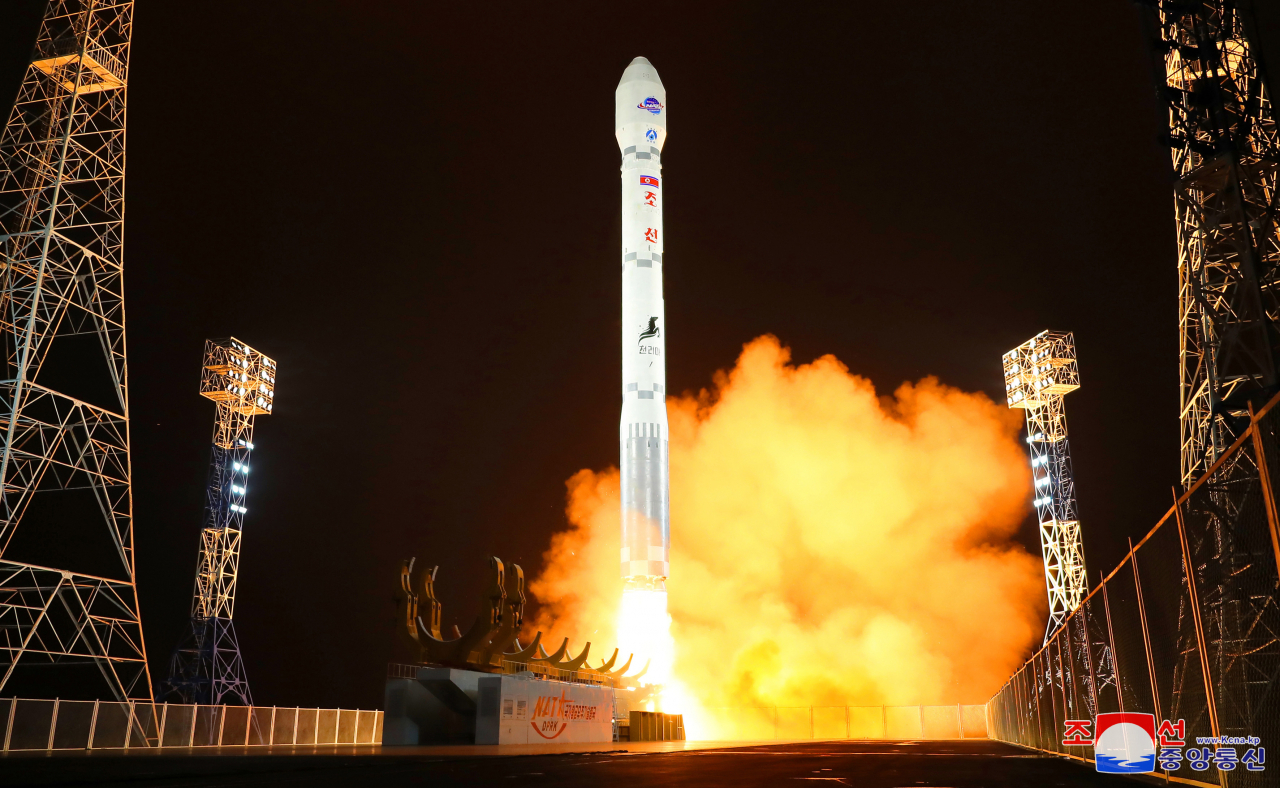S. Korea partially suspends inter-Korean military agreement
NK says reconnaissance satellite operation is set to begin Dec. 1
By Ji Da-gyumPublished : Nov. 22, 2023 - 12:08

South Korea on Wednesday decided to partially suspend a 2018 inter-Korean military agreement in order to resume reconnaissance near the border and enhance its readiness posture, hours after North Korea launched a military spy satellite.
President Yoon Suk Yeol -- currently on a state visit to the United Kingdom -- gave his approval for a proposal to suspend the implementation of the no-fly zone clause in the Sept. 19 Comprehensive Military Agreement.
Yoon's assent came hours after he presided virtually over an emergency meeting of the National Security Council standing committee from London, immediately after what North Korea claimed was a military reconnaissance satellite launch on Tuesday night.
The Ministry of National Defense said the partial suspension would take effect from 3 p.m. on Wednesday.
The two Koreas agreed to establish no-fly zones for all aircraft above the Military Demarcation Line effective from November 2018. The restrictions have made the security posture of the border area more vulnerable amid escalating missile and nuclear threats from North Korea, the NSC standing committee said after the emergency meeting in a written statement.
The NSC pointed out that North Korea has stated that the purpose of launching a spy satellite is to "identify the military activities of South Korea, the United States and Japan and to ensure the preemptive use of military power."
"It is our firm conclusion that prolonged restrictions on our military's intelligence and surveillance activities in the border areas, as outlined in the Sept. 19 military agreement, would considerably weaken our readiness posture," Prime Minister Han Duck-soo said at a Cabinet meeting held following the NSC meeting.
"Consequently, this could potentially compromise our ability to safeguard the lives and safety of our citizens," he said.
Han said that the constraints imposed by the Sept. 19 pact have resulted in limitations on the South Korean military's ability to detect potential long-range artillery attacks by North Korea against the densely populated Greater Seoul area and to adequately train in preparation for such potential attacks.
"By immediately resuming military reconnaissance and surveillance activities along the Military Demarcation Line specifically aimed at North Korea, our military will significantly enhance its ability to identify threat targets and response posture against North Korea," Han said.
"The measure is essential for our national security and is the minimum defensive action required," he said.

Yoon approved the proposal to partially suspend the inter-Korean military agreement hours after North Korea launched the Chollima-1 space launch vehicle carrying the Malligyong-1 military reconnaissance satellite.
North Korean state media claimed that the launch -- which was conducted with the attendance of North Korean leader Kim Jong-un -- was "successful." Later in the day, the North's state media said its reconnaissance satellite will begin its operations starting Dec. 1, while claiming to have received photos of Andersen Air Force Base, Apra Harbor and other major military bases in Guam from the satellite.
The Chollima-1 followed its planned flight trajectory, placing the Malligyong-1 reconnaissance satellite into orbit at 10:54 p.m., precisely 705 seconds after liftoff, according to North Korean state media reports.
South Korea's Joint Chiefs of Staff also confirmed that North Korea's spy satellite entered orbit, emphasizing the need for further analysis to assess its normal functionality.
"The launch of a reconnaissance satellite constitutes the legitimate right of the Democratic People's Republic of Korea to strengthen its right to self-defense," North Korea's state media said in a Korean-language dispatch, referring to the country by its official name.
"It will greatly contribute to firmly enhancing the war readiness of the armed forces of the DPRK, aligning with the security conditions established in the nation and its surrounding regions due to the perilous military maneuvers of adversaries," it continued.
Pyongyang also reiterated its commitment to persist with satellite launches utilizing ballistic missile technologies, a practice strictly prohibited by UN Security Council resolutions.
The National Aerospace Technology Administration has a plan to "launch several additional reconnaissance satellites in a short span of time to continue to secure reconnaissance capabilities in the South Korean region and areas of operational interest to the DPRK's armed forces," the state media said Wednesday.
The NATA is to officially present the plan to the Ninth Plenary Meeting of the Central Committee of the Workers' Party of Korea, without specifying the date of the meeting.
North Korea has sought to launch "a large number of reconnaissance satellites" for military purposes by 2025, as ordered by the North Korean leader in March 2022.



















![[Today’s K-pop] Treasure to publish magazine for debut anniversary](http://res.heraldm.com/phpwas/restmb_idxmake.php?idx=642&simg=/content/image/2024/07/26/20240726050551_0.jpg&u=)